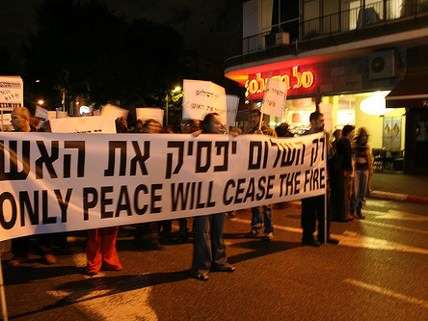The Battered Israeli Anti-War Movement

As the latest war between Israel and Hamas continues to rage on and rising Palestinian civilian body counts leave Israel further isolated from the international community, one wonders: What happened to Israel's anti-war movement?
Despite being at war for nearly its entire existence, there has always been a robust peace movement in Israel. But this time around, the doves are the fringe in Israeli society. Last Saturday in Tel Aviv, the largest anti-war protest since the latest battle began was attended by a few thousand people (estimates vary from 1,000 to 5,000) and a recent poll shows 87 percent of Jewish Israelis support continuing the siege on Gaza.
In a small nation with compulsory military service, where every single miltary casualty is national news, and the country's political class is willing to trade thousands of Palestinian prisoners for a single Israeli soldier (and sometimes for the bodies of fallen soldiers), it is no small thing to loudly advocate against war. Accusations ranging from dangerous naivite to being a self-hating Jew to aiding the enemy are common.
As Marina Strinkovsky wrote in the New Statesman:
Protest is one thing, but the angry recriminations of loved ones—that is something I admit is beyond the scope of my bravery. In my life, I have faced potatoes lobbed at me from upper floors by small children on demonstrations and anguished accusations of indifference to my family's safety. I know which hurt more.
Harriet Sherwood of The Guardian adds:
It is a big contrast with the 400,000 people—then almost a tenth of the country's population – who took to the streets in 1986 to protest about Israel's war in Lebanon. In 1995, 100,000 people attended the rally in support of the Oslo accords at which prime minister Yitzhak Rabin was assassinated. And in 2009 several thousand people joined peace marches during Operation Cast Lead, Israel's three-week assault on Gaza….
The reasons for the decline of Israel's peace movement are, inevitably, complex and interrelated. They include the failures of the Oslo accords and of successive attempts to forge a peace deal; the growing voice of the extreme right in Israeli politics; the "normalisation" of the 47-year-long occupation; and the relative marginalisation of the Palestinian cause both in Israel and internationally.
Added to that mix is weariness and hopelessness. "I think the peace movement became frustrated that nothing changes," said Maayan Dak of the Women's Coalition for Peace. "Things just repeat. People feel there is no point."
Beyond failed diplomacy and a generations-long occupation, the collapse of the Israeli anti-war movement can also be attributed to the dread felt by Israelis over rockets that have reached further into their cities than ever before and the discovery of sophisticated tunnels that go deep into their country. If the polls are to believed and the sparsely attended protests are any indication, the Israeli populace is far more concerned with temporary security than permanent peace.
Few would argue against Israel's right to defend itself against attacks from Hamas, whose unwillingness to ever recognize Israel is well documented, but talk of a lasting peace between Israel and the Palestinians pretty much died last month (along with John Kerry's Nobel Peace Prize ambitions), when Israeli Prime Minister Benjamin Netanyahu told reporters he would never allow for a fully soveriegn Palestinian state in the West Bank. While not explicitly rejecting a two-state solution, Netanyahu reiterated the popular opinion among Israelis that the country's unilateral 2005 pullout from the Gaza Strip created the conditions that led to the current war with Hamas and that he would never allow for such a security vacuum to exist in the West Bank.
Israel's security concerns aside, no one in the Palestinian political camp, even Israel's on-again, off-again negotiating partner, Fatah, would ever agree to Israeli police and military patrolling inside a nominally sovereign Palestinian state. Thus, the status quo of Israeli occupation over the West Bank, a near-total blockade of the Gaza Strip, and brief wars every few years that leave both sides further hardended, will be kept in place.
When the latest fighting goes into "cease-fire" mode (not to be confused with peace) Israelis will once again be at a crossroads. Will they have made their point by destroying a few dozen tunnels and leveling much of Gaza's infrastructure? Will they follow the lead of their late ex-Prime Minister Ariel Sharon (no dove by any stretch of the imagination) and make tough concessions including dismantling illegal settlments and negotiating directly with the people they've fought for decades?
The answer is unlikely, unless a lasting peace is as much of a priority as temporary security.


Show Comments (208)